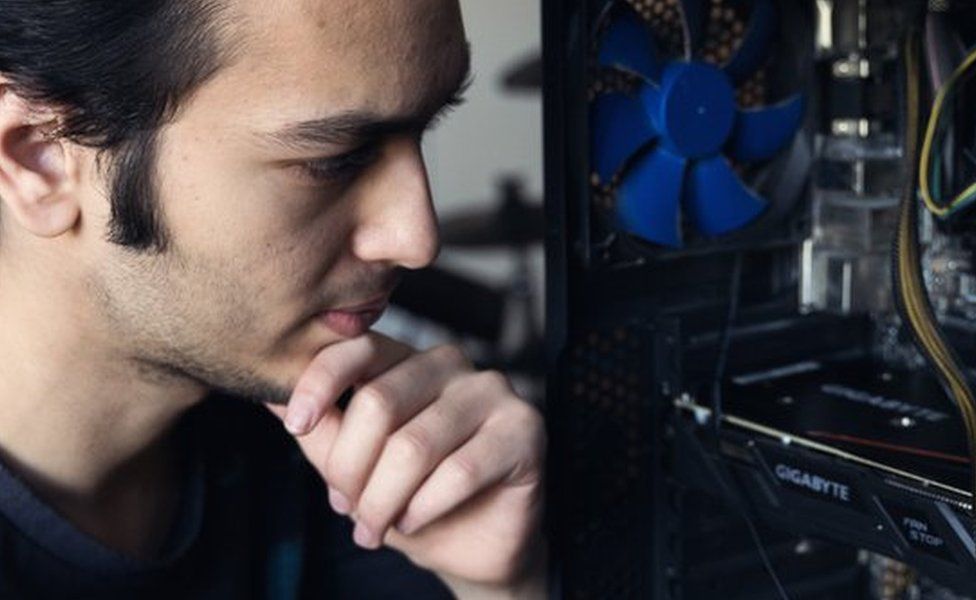Bullets rained down from all angles but Abdelrhman Badr kept calm.
Suddenly an enemy burst through a window. Abdelrhman swung round to face the soldier and save his team. He lined up his sights for a fatal shot and squeezed the trigger but… his screen went black.
His computer had silently and suddenly shut itself down without warning.
Abdelrhman was confused. The game he was playing had never caused problems before.
He reached down and looked inside his computer, which he liked to leave open and on display in his bedroom.
Instinctively he touched one of the components, cursed and pulled his hand back. The graphics card was so hot it had burned his fingers.
The 18-year-old from Sheffield hadn’t realised it yet, but this minor injury was caused by crypto-jacking.
Crypto-jacking is the unauthorised and illegal use of someone’s computer to collect Bitcoin and other crypto-currencies.
There are estimated to be more than 47 million crypto-currency users around the world, although it is difficult to be sure because of their anonymity. Users collect virtual coins by a complex process called “mining” which puts computers through a series of mathematical problems.
In a crypto-jacking operation, hackers fool victims into downloading a malicious file that surreptitiously forces their computers to mine for this money and send it back to the criminals who can spend it on crypto-currency marketplaces or turn it into mainstream cash.
Crypto-jacking attacks increase a victim’s electricity bill and can not only slow down infected computers but potentially cause irreparable damage to hardware.
Last week, at least a dozen supercomputers across Europe had to be shut down after hackers targeted them with crypto-jacking attacks.
Abdelrhman Badr has no idea how hackers got into his system. He thinks he must have accidentally downloaded the malware three weeks before he burned his hand, when he started noticing strange things happening to his computer.
“Whenever I put my PC to sleep the screens would go blank but I could still hear the fans running and when I came back to it, it would just open up to the main desktop with none of the usual login page or anything,” he says. “My computer wasn’t actually going to sleep at all.”
‘Shocked and embarrassed’
Even when he burned his hand, he didn’t at first consider he was the victim of a hack.
It was actually a mistake that led to his discovery.
“I was playing around with a program that monitors computer activity and everything looked normal but I accidentally left it on overnight,” he recalls.
“When I next checked I found that my computer had been sending loads of information back to a strange website I’ve never visited or heard of.”
The website was set up to collect the crypto-currency Monero. .
“I was shocked and also a bit embarrassed as I take pride in keeping my PC safe. It’s really frustrating to know that there could be a program running without me knowing and some guy secretly mining crypto, destroying my hardware and stealing my electricity.”
There could be hundreds, or even thousands of victims like Abdelrhman, who are unwittingly lining the digital wallet of this hacker or hackers.
“Crypto-jacking attacks are becoming more sophisticated, using techniques to hide their behaviour,” says Alex Hinchliffe, a threat intelligence analyst at Palo Alto Networks.
“Cyber-criminals(Hackers) look for as many victims’ systems as possible. The more systems, whether it be PCs, servers, cloud services, mobile and other smart devices the better, as more mining can be achieved in a relatively benign and unobtrusive manner.”
Crypto-jacking ‘on the rise’
Experts say the threat of crypto-jacking rises and falls with the fluctuating price of crypto-currencies. According to research from Palo Alto Networks, the attacks are currently on the rise.
“It’s not as profitable as it used to be for hackers so crypto-miners are showing up in the weirdest places on the internet to maximise the number of victims. Sometimes we find them hidden inside the code of free programs, for example,” adds Ryan Kalember from Proofpoint, another information security company.
Security specialists say computer users should be vigilant and look out for changes to their computers, such as a slowing down of performance, or changed settings. It’s also a good idea to install some security software and do regular virus scans.













![Hotstar Premium Cookies 2019 [*100% Working & Daily Updated*] Hotstar Premium Cookies 2019 [*100% Working & Daily Updated*]](https://tahav.com/wp-content/uploads/2019/11/Hotstar-Premium-Cookies-Free-100x70.jpg)



